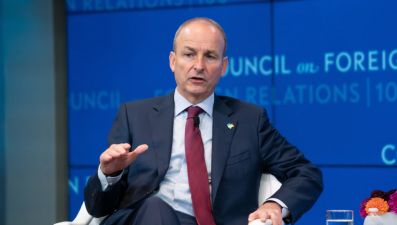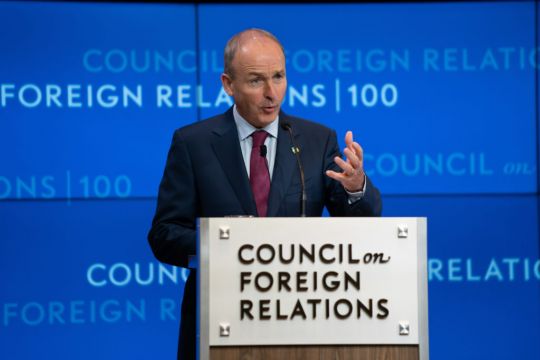The Taoiseach used a speech before the United Nations General Assembly on Friday to call on global leaders to respond without delay to the challenges of Covid-19 and climate change.
In a speech that echoed comments Mr Martin made at the UN Security Council on Thursday, he said that at meetings in New York this week a “series of alarms have sounded” on conflict, Covid-19 and climate change.
He urged the global community to face the "moral test" of Covid vaccine inequity.
“We have heard the alarms – now we must respond,” he told world leaders.
Mr Martin has been in New York all week for a series of UN engagements. On Thursday he presided over a debate on climate and security at the UN headquarters in New York, the first time an Irish Taoiseach has chaired such a meeting.
The Taoiseach warned that countries can no longer deny the reality of climate change.
“Climate change is the single greatest challenge facing our generation.
The United Nations is a symbol of hope for billions of people around the world.
The UN flag, a beacon of peace across the globe.
The blue helmets, guardians to the most vulnerable.
UN convoys, a lifeline to millions.
#UNGA pic.twitter.com/GEkQEa4FSE— Micheál Martin (@MichealMartinTD) September 24, 2021
Advertisement
“Its impact is devastating on our environment and ecosystems and our collective security is at risk.
“We have seen, time and time again, that the most catastrophic impacts disproportionately affect the most vulnerable and the least responsible.
“We must deliver on the Paris Agreement commitments and we will shortly have important discussions at Cop26.
“But we can see the adverse effects of climate change already exacerbating conflict and insecurity, compounding other drivers of conflict such as poverty, inequality and human rights violations.”
'One mind'
Mr Martin said that he was aware that “not all Council members are of one mind on this”.
“My hope is that by working together, we can and we will reach a shared understanding of how the Security Council can meet the challenge of climate and security,” he said.
“There is no time to waste. For this reason, in the coming days Ireland will convene a discussion on a thematic Security Council resolution on climate and security.”
In the address, Mr Martin said that the pandemic had “cast a shadow over our world” and appealed to states to back the Covax programme, which aims to provide poorer states with vaccines from wealthy countries.
Vaccine inequity is a moral test for our global community
“Vaccine inequity is a moral test for our global community,” Mr Martin told an audience that included UN secretary general Antonio Guterres.
The Taoiseach said that backing Covax was the “only way we can meet the target of a fully vaccinated world by mid-2022”.
Mr Martin has used his week in New York to highlight the need for action on global conflict and climate change.
An Irish resolution is calling for UN agreement on the link between climate change and conflict.
This week, in this hall, a series of alarms have sounded:
- they have sounded for conflict;
- they have sounded for COVID;
- they have sounded for climate.
We have heard the alarms – now we must respond.#UNGA76 pic.twitter.com/ymNSn9WZB9— Micheál Martin (@MichealMartinTD) September 24, 2021
He also acknowledged the UN and the Security Council’s failures, name checking the conflict in Syria as an example.
“Progress has not always been possible. Too often, the Council has been divided. It is a lesson hard learned that when we, in this building, are divided, it is the most vulnerable who suffer the consequences.”
Mr Martin also spoke about conflict in Israel and Palestine.
“The escalation of the Israeli/Palestinian conflict in May resulted in more lives lost, including the deaths of more than 70 children,” he told the audience.
“Ireland was deeply frustrated by the Council’s inability to speak throughout this latest outbreak of hostilities. While we welcomed the press statement agreed on 22nd May, it was too little, too late.”
The Taoiseach also used his speech to highlight the need to support the people of Afghanistan, following the Taliban takeover.

“The most vulnerable – women, girls, boys, men, LGBTQI persons and persons with disabilities – must be protected,” he said.
Mr Martin also spoke about what he called the “deteriorating situation” in the Tigray region of Ethiopia.
“We must stand firm and united in support of the secretary general’s call for a negotiated ceasefire, unimpeded humanitarian access and restoration of basic services to all affected areas, and a political solution to the crisis.”







